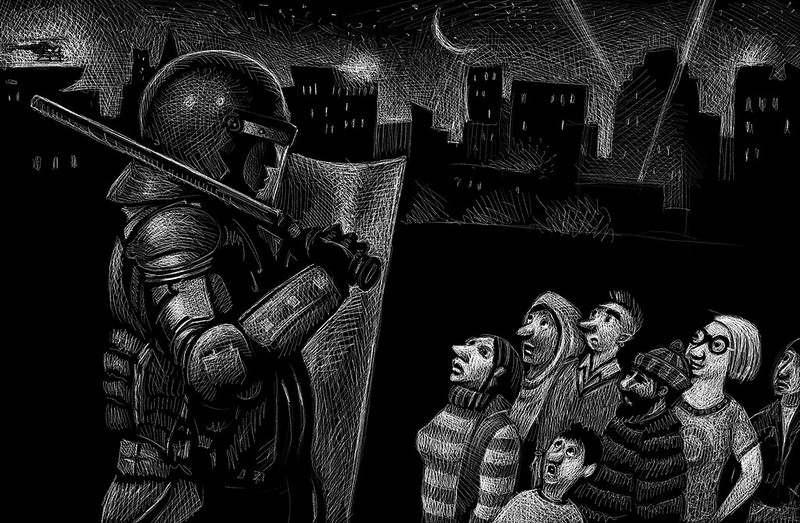Just over a year after the approval of the new national migration law, the new text has been amended by the legislature. The text deals with the regulation of refugee status and its procedures to cope with the increase in applications. It establishes stricter criteria, recognizing as refugees only those who come directly from threatened territories and limiting their stay in third countries to 60 days.
Refugee status is granted based on imminent danger in the country of origin, political persecution, lack of similar applications in other states, and reasons for not applying for refugee status during transit. Procedural rules have been removed, with an emphasis on streamlining the response to applications and reducing illegal immigration, making it easier to deport migrants.
The bill was approved in the Chamber of Deputies with 126 votes in favor, three against, and nine abstentions. Lawmakers believe it will help close the doors to ‘illegal immigration’.
According to the Secretary of State for the Interior, Manuel Monsalve, the aim is to better control the entry and expulsion of migrants. He highlights the implementation of measures such as the biometric identification of migrants in an irregular situation, with 170,000 people voluntarily registered. The focus is on expelling those who do not cooperate by providing information on their background, with an emphasis on cooperation with other countries to obtain relevant data.
Monsalve highlights the complexity of Chile’s borders, which are 1,000 kilometers long, with hundreds of unauthorized crossings. He points out that the country is facing the largest migration crisis in Latin and Central America, with seven million Venezuelan citizens leaving their country. He stresses the need to control the border and explains the extension of the control zone to 10 kilometers. In practice, the new law is anti-Venezuelan migration legislation.
This law, and especially these latest amendments, are very similar to those of the “first world” countries, which, in their efforts to stop the flow of people fleeing social and economic catastrophes, unleash their unilateral measures of the massacre of civilian populations with NATO military attacks, overt or covert arms sales that accelerate internal conflicts in the countries in question, and measures of the economic blockade of countries to provoke the overthrow of their governments that do not conform to “Western democracy”.
Without taking responsibility for the reasons described above, those in power choose to torpedo the humanist foundations to give in to the racist and fascist extreme right, with a policy that once again criminalizes the foreigner, the migrant, those who are different, and those who show solidarity with them. And it is certainly not valid to link the state’s difficulties in controlling crime, the spread of drug trafficking, and, in short, the public security situation, with such a different issue as the social and political phenomenon of human migration.
Proposals for the humane treatment of migrants
Human life is sacred, and in the conviction that there can be no progress unless it belongs to all and for all, we promote a coherent and urgent response by governments, through measures such as
– Scrupulous compliance with the Declaration of Human Rights and international laws on asylum and migration.
– No to the criminalization of migrants and refugees – No human being is illegal!
– Move towards the abolition of borders, which exist only to separate the poor and have no reality for capital and the increasingly scandalously rich minority of the planet.
– Stop spending citizens’ taxes on ‘border control’, the ‘externalization’ of borders, and the creation of ‘migrant prisons’. We propose that these funds
be spent on other aspects, such as the reception of these people who need a new chance in life.
– Stop criminalizing NGOs and aid workers who are trying to save people’s lives.
– Provide legal entry channels for a real and effective fight against the mafias that speculate in human trafficking. Not only by creating “humanitarian corridors”, but above all by granting legal entry documents.
– Permanent denunciation to highlight the lack of complete control of arms sales to countries in conflict, directly or indirectly from third countries.
– Abandoning the defense of the capitalist model, which in practice has become an anti-humanist current that does not take into account how its orientation towards the accumulation of money, privileges, and power exponentially generates the disintegration of the daily lives of the great majority of wage-earners, pensioners and the unemployed.
In Chile, this is an issue that has had a profound impact. During the 1973 civil-military coup d’état, many people were forced to leave their homes and emigrate to other countries at different times, with waves of Chileans migrating to neighboring countries such as Argentina, Venezuela, or Brazil, while others chose to emigrate to countries further afield.
Forced migration left a deep mark on the lives of those who experienced it. Separating from their families, losing their homes, and adapting to new cultures were challenges they had to face. However, many have managed to rebuild their lives and contribute to the development of their new host countries. Such experiences are relevant as we seek to address the challenges facing our country today.
It is important to remember and learn from these experiences to work towards building a future in which peace and solidarity prevail above all in this turbulent and changing world. We agree with the words of Convergence of Cultures, an organization specializing in these issues: There is a need for encounter and dialogue between people of different cultures who can look at each other and say: “I exist because you exist”.
Co-authored by Ricardo Lisboa Henríquez; M. Angélica Alvear Montecinos; Guillermo Garcés Parada; Sandra Arriola Oporto and César Anguita Sanhueza. Public Opinion Commission










